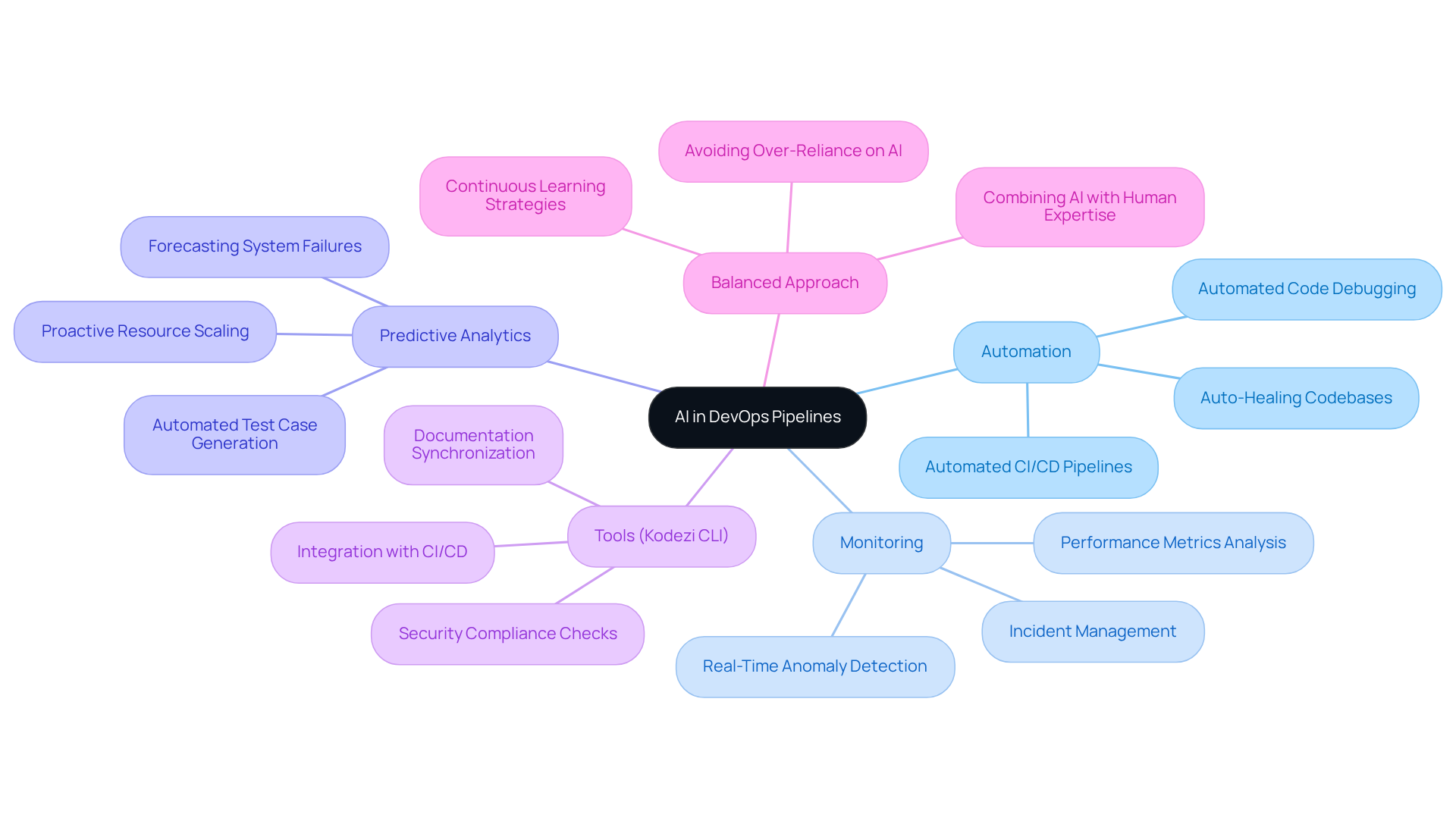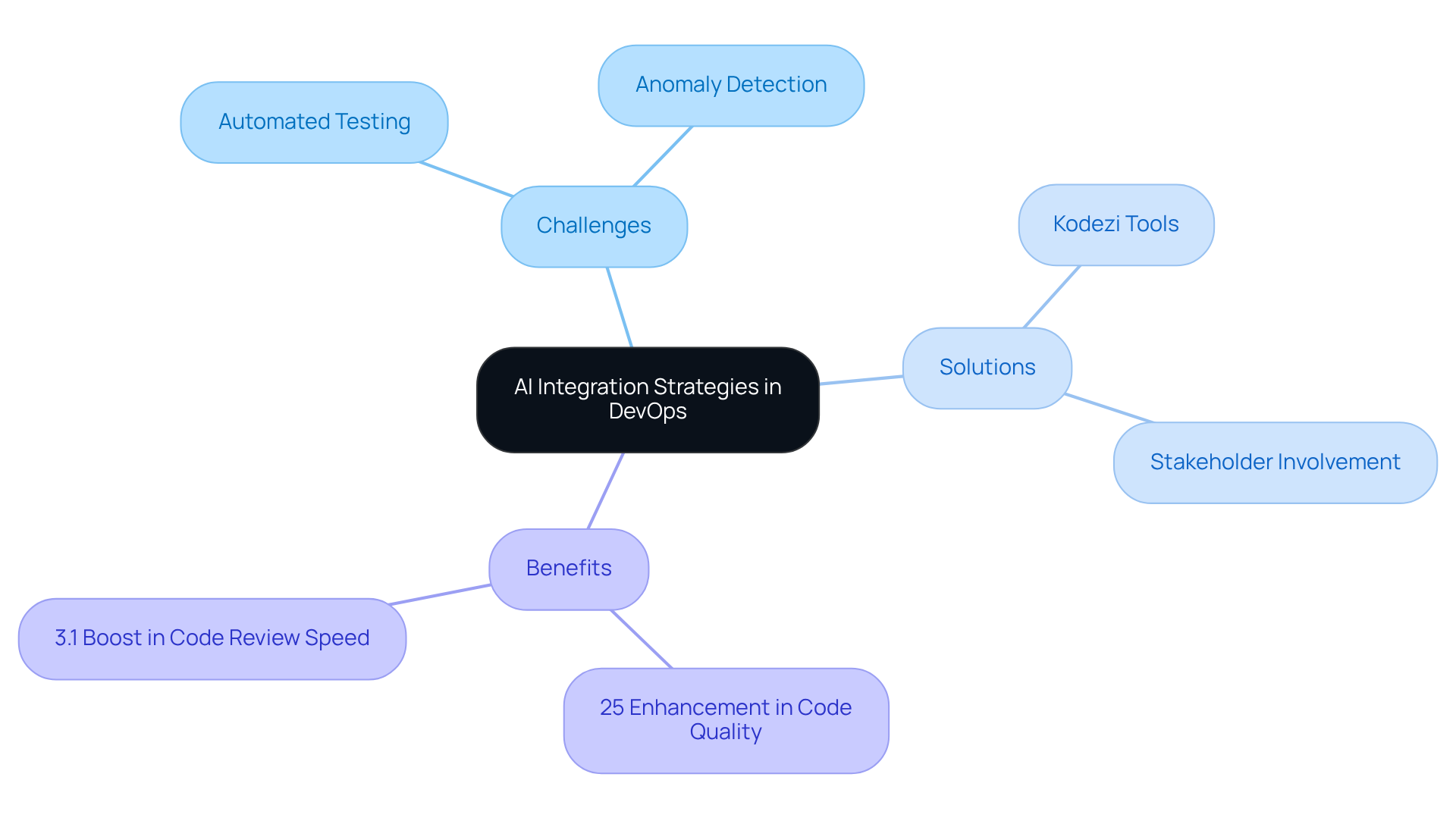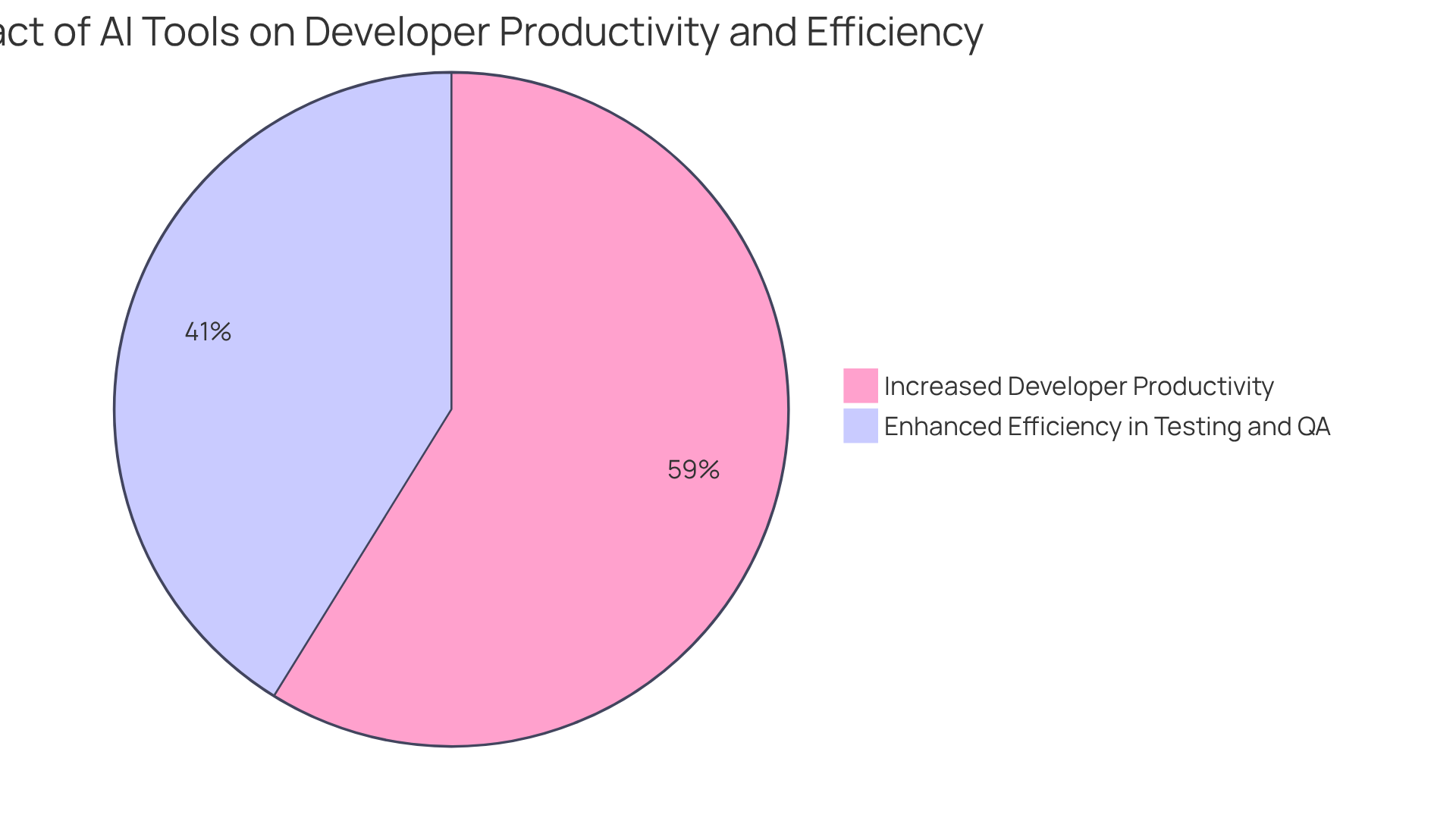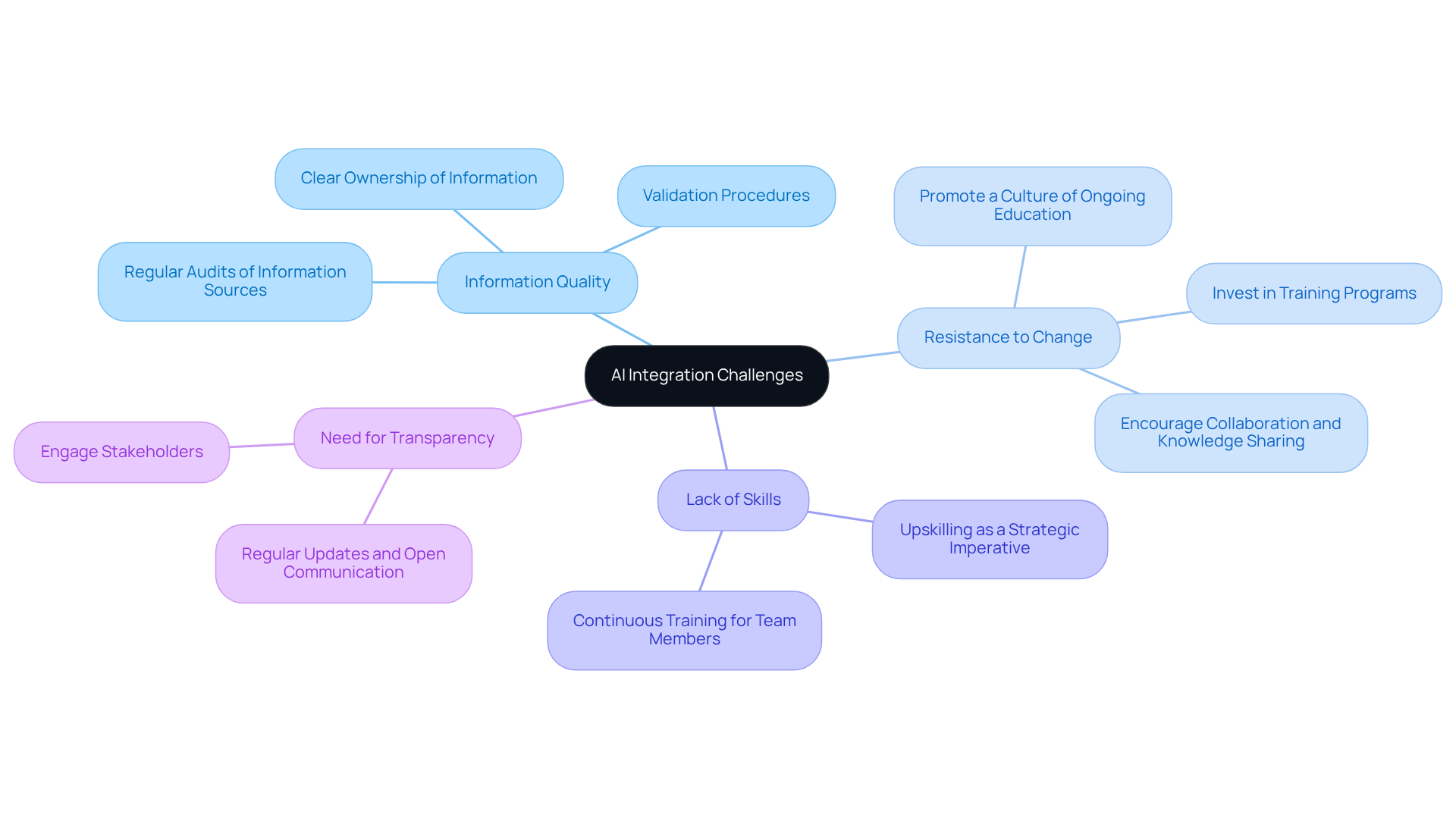Overview
In today's fast-paced development environment, coding challenges are a common hurdle that developers must navigate. Many struggle with productivity and maintaining code quality, leading to frustration and inefficiency. However, tools like Kodezi are designed to tackle these challenges head-on. With features that automate repetitive tasks and enhance monitoring, Kodezi streamlines the development process, allowing developers to focus on what truly matters—writing great code.
By leveraging Kodezi, developers can significantly boost their productivity and improve the quality of their code. Imagine reducing the time spent on mundane tasks and instead dedicating that time to innovation and creativity. The integration of AI in DevOps pipelines not only automates processes but also provides insights that help teams make informed decisions. This leads to a more efficient workflow and ultimately, a better end product.
Furthermore, it’s essential to address potential challenges when integrating AI tools. Issues like data quality and resistance to change can hinder the full realization of AI's benefits. By proactively tackling these challenges, teams can maximize the advantages that Kodezi offers, ensuring a smoother transition to a more automated workflow.
Are you ready to elevate your coding practices? Explore the powerful tools available on the Kodezi platform and discover how they can transform your development experience. Embrace the future of coding with AI integration and unlock new levels of efficiency and quality in your projects.
Introduction
In a landscape where software development is constantly evolving, developers frequently encounter significant coding challenges. How can these hurdles be effectively addressed? Enter Kodezi, a transformative tool designed to streamline the coding process. With features that simplify collaboration and enhance code quality, Kodezi empowers teams to tackle common issues head-on.
Utilizing Kodezi not only boosts productivity but also improves the overall quality of software delivered. By leveraging its capabilities, organizations can minimize errors and accelerate development cycles. Furthermore, the integration of AI into DevOps pipelines, as seen with Kodezi, stands out as a game-changer, enabling teams to focus on innovation rather than repetitive tasks.
However, the journey toward successful AI integration is not without its challenges. How can organizations effectively balance the benefits of AI with the potential pitfalls of over-reliance on automation? Exploring strategic approaches to this integration could unlock new levels of efficiency and innovation in the realm of DevOps. By embracing tools like Kodezi, teams can enhance their coding practices and ultimately deliver higher quality software. Are you ready to explore the tools available on the platform?
Understand the Role of AI in DevOps Pipelines
In today's fast-paced development environment, coding challenges can significantly hinder productivity. The DevOps pipeline AI integration is revolutionizing modern DevOps by automating repetitive tasks, enhancing monitoring capabilities, and delivering predictive analytics. Kodezi addresses these challenges by enabling teams to swiftly recognize bottlenecks and inefficiencies within their workflows, facilitating faster and more reliable software delivery. For instance, the automated code debugging function allows developers to quickly identify and rectify codebase problems, offering detailed clarifications of what occurred and how to address it. This capability not only enhances code quality but also ensures compliance with the latest security standards and coding practices, integrating seamlessly into release processes.
Furthermore, Kodezi CLI serves as a versatile tool for teams, enabling them to auto-heal codebases in seconds, thus eliminating the time wasted on pull requests. By utilizing DevOps pipeline AI integration in CI/CD procedures, teams can achieve increased agility and responsiveness to changing market demands, resulting in enhanced product quality and greater customer satisfaction. Have you considered how much time you could save by leveraging such tools?
In addition, it is essential to recognize that while AI offers significant advantages, over-reliance on these tools can lead to missed architectural inefficiencies. This highlights the importance of a balanced approach that combines AI capabilities with human expertise. Explore the tools available on the Kodezi platform to elevate your coding practices and improve overall productivity.

Implement Effective AI Integration Strategies
To effectively implement devops pipeline ai integration, consider the coding challenges that developers frequently encounter. These pain points, such as the need for automated testing and anomaly detection, can significantly hinder productivity. How can Kodezi help? By providing versatile tools that autonomously enhance codebases and fix bugs before they reach production, Kodezi addresses these challenges head-on.
In addition to improving code quality, Kodezi boosts productivity, allowing teams to focus on more strategic tasks. Establishing clear metrics for success is crucial, as it enables you to evaluate the impact of AI on your workflows. For instance, statistics indicate that organizations that implement devops pipeline ai integration into their development practices can anticipate a 25% enhancement in code quality and a 3.1% boost in code review speed, as highlighted in the 2024 DORA Report.
Furthermore, involving all stakeholders in the integration process ensures buy-in and addresses any concerns. As Pierre Gilbert, a Software Delivery Expert, states, 'AI will be key to preventing failures and identifying root causes more quickly by analyzing patterns, correlating information from extensive system logs, and learning from past incidents.' This insight underscores the potential benefits of thoughtful AI adoption within a devops pipeline ai integration.
Are you ready to explore the tools available on the Kodezi platform? With Kodezi, you can revolutionize your coding practices and unlock new levels of efficiency.

Leverage Benefits of AI for Enhanced Efficiency
Developers often face significant challenges in coding, particularly when it comes to efficiency and bug resolution. The devops pipeline AI integration can yield substantial efficiency gains, and Kodezi effectively addresses these challenges. The CLI independently enhances codebases and resolves issues prior to production, allowing developers to focus on strategic initiatives. For instance, Kodezi's AI-powered tools automate routine tasks such as bug fixing and code evaluations, significantly improving the debugging process. Users have noted considerable enhancements in their efficiency, with one user from the Massachusetts Institute of Technology stating, 'This tool has assisted me in locating and resolving bugs more quickly and effortlessly than attempting to do it manually.' Another user, a software engineer, remarked that the platform feels like 'unlocking a new superpower' for debugging.
A study indicates that:
- 60% of respondents report increased developer productivity due to AI tools.
- 42% note enhanced efficiency in testing and QA activities.
Furthermore, the platform improves collaboration by offering insights and suggestions derived from past data, enabling teams to make informed decisions swiftly. By leveraging Kodezi CLI, organizations can achieve higher deployment frequencies, improved software quality, and reduced operational costs, ultimately driving better business outcomes. This shift towards AI-driven automation, especially through devops pipeline AI integration, is not just a trend; it is becoming essential for maintaining a competitive advantage in the rapidly evolving software landscape.
Are you ready to transform your coding practices? Explore the tools available on Kodezi and experience the benefits of enhanced productivity and code quality.

Address Challenges in AI Integration
The devops pipeline ai integration provides developers with both opportunities and challenges. While it can significantly enhance efficiency and productivity, teams must navigate several hurdles, starting with the quality of information. Have you considered how subpar information quality can lead to flawed AI predictions and unproductive automation? This undermines the potential advantages of AI. To combat this, organizations need to establish strong information governance frameworks that ensure high-quality inputs for AI systems. This includes:
- Regular audits of information sources
- Validation procedures
- Clear ownership of information
In fact, did you know that 42% of organizations do not trust their AI models? This statistic highlights the critical need for effective data governance.
Furthermore, resistance to change is a common obstacle. Teams may hesitate to adopt new technologies due to fears of disruption or a lack of understanding of AI's capabilities. How can organizations promote a culture of ongoing education? Investing in training programs equips team members with the necessary skills to utilize AI effectively. As noted by Murugan Anandarajan, a significant challenge in launching AI initiatives is the lack of AI skills and training, making upskilling a strategic imperative. Encouraging collaboration and knowledge sharing can also help alleviate fears and foster a more agile mindset.
In addition, transparency throughout the integration process is crucial. Keeping stakeholders informed and engaged builds trust and ensures that everyone understands the objectives and benefits of AI adoption. Regular updates and open communication channels facilitate this transparency, allowing teams to address concerns and celebrate milestones together.
By proactively tackling these challenges—prioritizing data governance, fostering a culture of learning, and maintaining transparency—teams can significantly improve their chances of successful AI integration in software development operations. This strategic approach not only mitigates risks but also maximizes the potential for automation and optimization, ultimately leading to improved performance and innovation. Organizations that implement devops pipeline ai integration have reduced their release cycles by an average of 67%. Isn't that a compelling reason to overcome these challenges?

Conclusion
The integration of AI into DevOps pipelines represents a transformative shift that enhances productivity and efficiency in software development. Developers often face significant coding challenges that can hinder progress. How can these obstacles be overcome? AI tools like Kodezi automate repetitive tasks and provide valuable insights, empowering teams to tackle coding challenges effectively and streamline workflows. This synergy between human expertise and AI capabilities is crucial for navigating the complexities of modern software development.
Key strategies for successful AI integration include:
- Addressing coding pain points
- Establishing clear metrics for success
- Fostering a culture of collaboration and education
For instance, compelling statistics reveal a 25% improvement in code quality and a significant reduction in release cycles. These figures underscore the tangible benefits organizations can achieve through thoughtful AI adoption. Furthermore, understanding and overcoming challenges such as data governance and resistance to change are essential for maximizing the potential of AI in DevOps.
Ultimately, embracing AI integration in DevOps is not merely a trend but a strategic imperative for maintaining a competitive edge in an ever-evolving landscape. By prioritizing effective integration strategies and investing in the right tools, organizations can unlock new levels of efficiency, enhance product quality, and drive innovation. The future of software development is bright for those ready to harness the power of AI. Now is the time to explore the possibilities and elevate coding practices to new heights.
Frequently Asked Questions
How is AI integrated into DevOps pipelines?
AI is integrated into DevOps pipelines by automating repetitive tasks, enhancing monitoring capabilities, and delivering predictive analytics, which helps teams identify bottlenecks and inefficiencies in their workflows.
What challenges does Kodezi address in the development process?
Kodezi addresses coding challenges that hinder productivity by enabling teams to quickly recognize workflow inefficiencies and automate code debugging, which helps in identifying and rectifying codebase issues.
What is the role of automated code debugging in Kodezi?
The automated code debugging function in Kodezi allows developers to swiftly identify and fix problems in the codebase while providing detailed explanations of the issues and how to resolve them, thereby improving code quality and ensuring compliance with security standards.
What benefits does Kodezi CLI offer to development teams?
Kodezi CLI offers teams the ability to auto-heal codebases in seconds, reducing the time wasted on pull requests and enhancing overall efficiency in the development process.
How does AI in DevOps contribute to product quality?
By utilizing AI in CI/CD procedures, teams can achieve greater agility and responsiveness to market changes, which leads to enhanced product quality and increased customer satisfaction.
What is the potential downside of relying too much on AI in DevOps?
Over-reliance on AI tools can result in missed architectural inefficiencies, emphasizing the need for a balanced approach that combines AI capabilities with human expertise.
How can teams explore AI tools to improve productivity?
Teams can explore the tools available on the Kodezi platform to elevate their coding practices and improve overall productivity in their development workflows.




